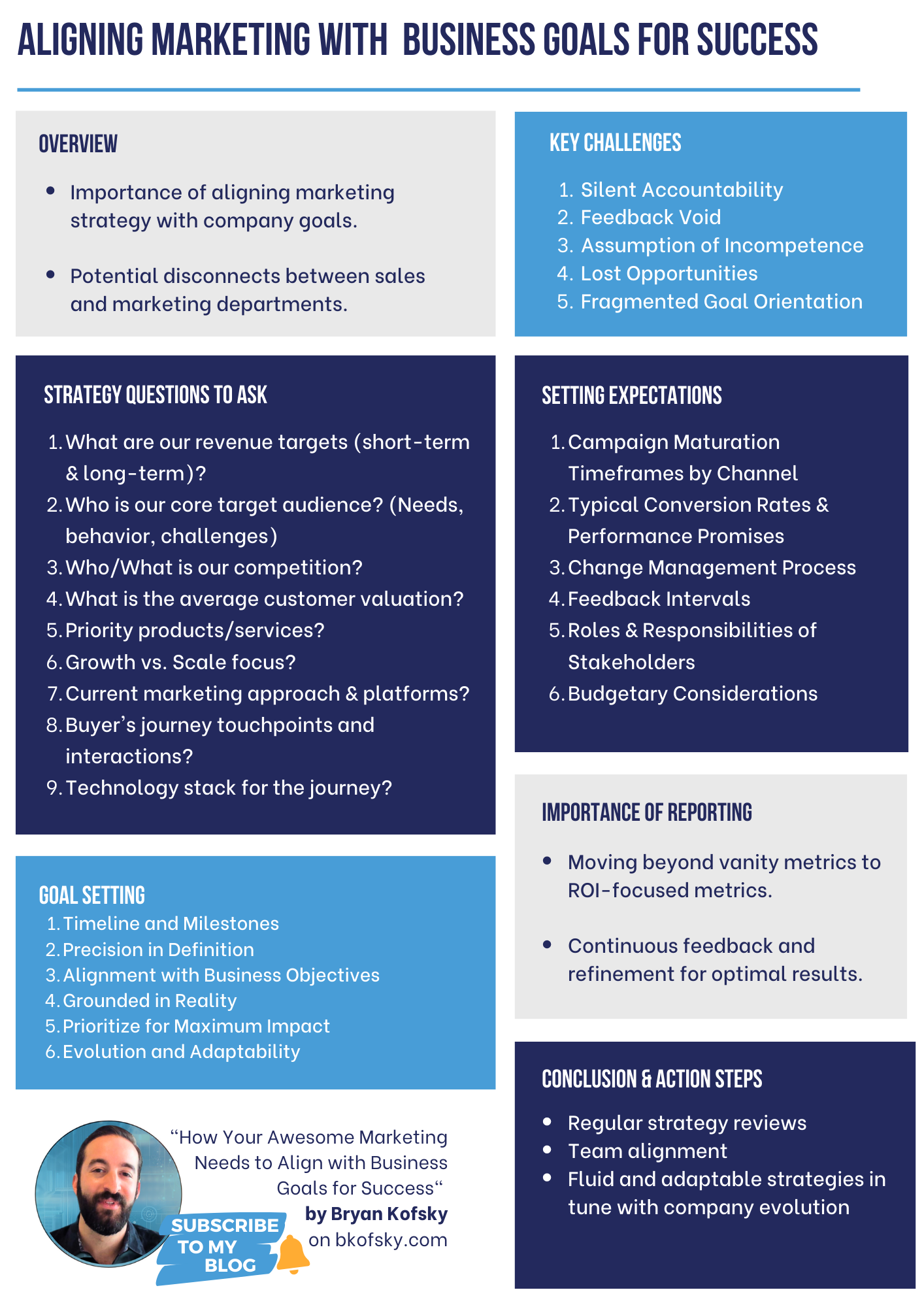Finding Harmony: Marketing and Business Goals
In the fast-paced world of business, it can be easy to get caught up in the daily tasks and forget about the big picture. However, in order to truly succeed, it is crucial to align your marketing strategy with your overall business goals. This harmony between marketing and business goals is what sets successful companies apart from the rest.
When it comes to marketing, the ultimate goal is to promote your products or services in a way that attracts customers and drives sales. However, this cannot be done in isolation from the broader goals of the business. Your marketing strategy should be directly tied to your business objectives, whether that is increasing revenue, expanding into new markets, or building brand awareness.
One way to ensure that your marketing and business goals are aligned is to start by clearly defining what those goals are. Take the time to sit down with key stakeholders in your company and discuss what you are trying to achieve. By having a clear understanding of your business goals, you can then tailor your marketing strategy to support those objectives.
For example, if your business goal is to increase revenue by 20% over the next year, your marketing strategy should focus on tactics that will help you achieve that goal. This might include running targeted advertising campaigns, launching new products or services, or offering special promotions to drive sales.

Image Source: bkofsky.com
In addition to aligning your marketing tactics with your business goals, it is also important to regularly track and measure the success of your campaigns. By monitoring key performance indicators (KPIs) such as website traffic, conversion rates, and customer engagement, you can see if your marketing efforts are helping you to reach your business objectives.
Moreover, finding harmony between your marketing and business goals also involves ensuring that your messaging is consistent across all channels. Whether a customer interacts with your brand through social media, email marketing, or in-store promotions, they should receive a consistent message that reflects your overall business goals.
Another important aspect of aligning your marketing strategy with your business goals is to stay agile and adapt to changes in the marketplace. As consumer preferences and industry trends evolve, it is essential to be able to pivot your marketing tactics to meet these shifts while still supporting your overarching business objectives.
Ultimately, finding harmony between your marketing and business goals requires a strategic approach that takes into account the big picture while also focusing on the day-to-day tactics that will help you achieve success. By keeping your business objectives top of mind and aligning your marketing efforts accordingly, you can create a powerful synergy that drives growth and success for your company.
Mastering the Art of Strategic Alignment
In the fast-paced world of business, it can be easy to get caught up in the day-to-day tasks and lose sight of the bigger picture. However, in order to truly succeed, it is essential to align your marketing strategy with your business goals. This requires a careful balance between creativity and practicality, innovation and tradition, and short-term gains and long-term growth.
One of the key aspects of strategic alignment is understanding your target audience. In order to effectively market your products or services, you need to know who your customers are, what they want, and how they make purchasing decisions. By conducting market research and analyzing data, you can gain valuable insights that will help you tailor your marketing strategy to meet the needs of your target audience.
Another important factor in achieving strategic alignment is setting clear and measurable goals. Whether you are looking to increase sales, improve brand awareness, or launch a new product, it is essential to have a roadmap that outlines your objectives and the steps you need to take to achieve them. By setting SMART goals (specific, measurable, achievable, relevant, and time-bound), you can track your progress and make adjustments as needed to stay on track.
In addition to setting goals, it is also crucial to establish key performance indicators (KPIs) to measure the success of your marketing efforts. By tracking metrics such as website traffic, conversion rates, and customer engagement, you can gauge the effectiveness of your marketing campaigns and make data-driven decisions to optimize your strategy.
Furthermore, strategic alignment requires collaboration and communication across all departments within your organization. Marketing cannot operate in a vacuum – it needs to work hand-in-hand with sales, product development, customer service, and other teams to ensure that all aspects of the business are aligned towards a common goal. By fostering a culture of collaboration and open communication, you can break down silos and create a cohesive strategy that drives success.
Another important aspect of strategic alignment is staying adaptable and agile in the face of changing market trends and consumer preferences. The business landscape is constantly evolving, and what worked yesterday may not work tomorrow. By staying nimble and open to new ideas, you can pivot quickly and adjust your marketing strategy to stay ahead of the curve.
Ultimately, mastering the art of strategic alignment requires a delicate balance between creativity and analysis, intuition and data, and innovation and tradition. By aligning your marketing strategy with your business goals, you can create a cohesive and effective strategy that drives growth, builds brand loyalty, and achieves long-term success. By finding harmony between your marketing efforts and your business objectives, you can strike the perfect balance that leads to sustainable growth and lasting success.
How to Align Your Marketing Strategy with Your Business Goals